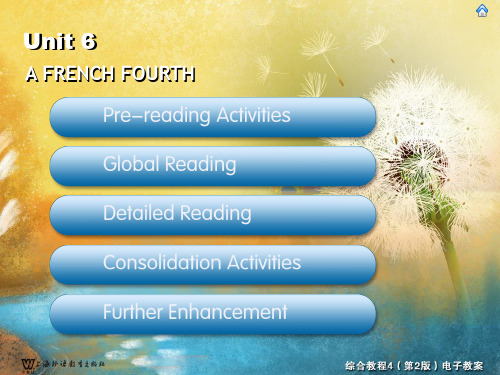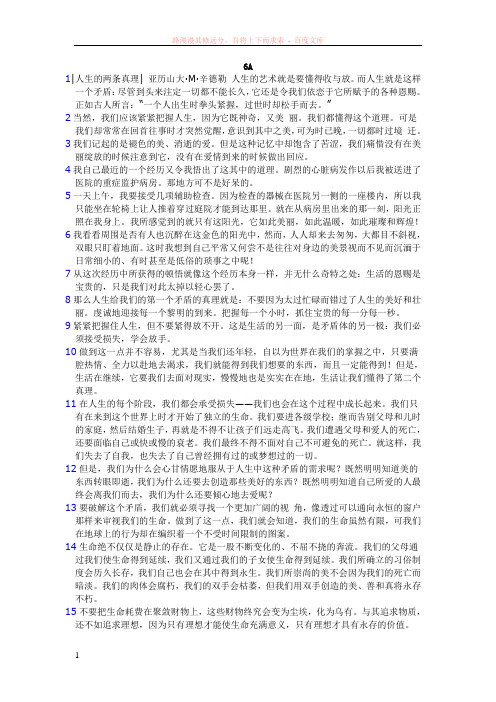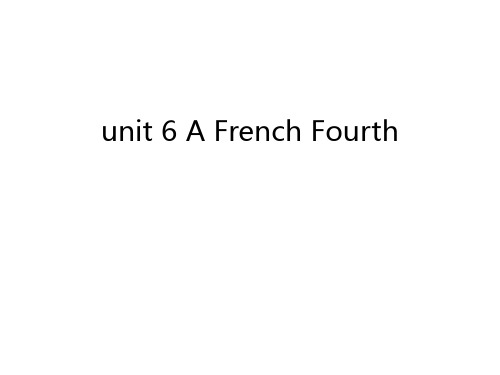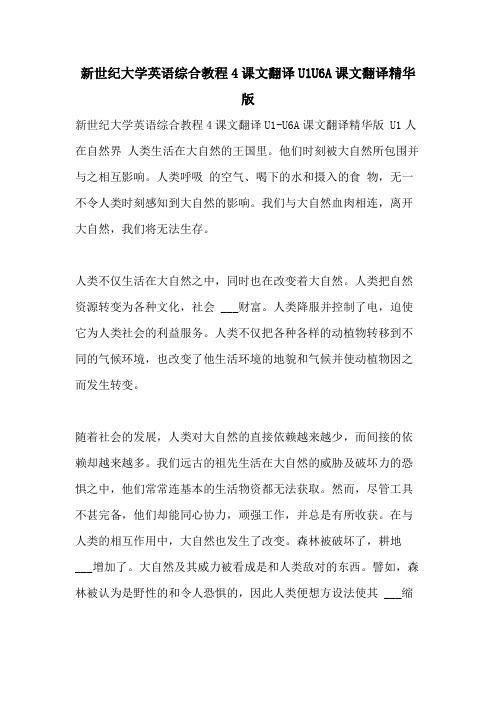Unit 6 A French Fourth课文翻译综合教程四
Unit6 A FRENCH FOURTH

General analysis
Structural analysis
Rhetorical features
In this text, the author discusses the costs and benefits of living in a foreign culture. He also points out that globalization is diminishing the divide between cultures.
• Chinatown, Dama occupying the Louvre
Audiovisual supplement
Cultural information
1. Independence Day In the United States, Independence Day, commonly known as the Fourth of July, is a federal holiday commemorating the adoption of the Declaration of Independence on July 4, 1776, declaring independence from the Kingdom of Great Britain. Independence Day is commonly associated with fireworks, parades, barbecues, carnivals, picnics, concerts, baseball games, political speeches and ceremonies, and various other public and private events celebrating the history, government, and traditions of the United States.
新世纪大学英语综合教程4课文翻译unit6

6A1|人生的两条真理| 亚历山大·M·辛德勒人生的艺术就是要懂得收与放。
而人生就是这样一个矛盾:尽管到头来注定一切都不能长久,它还是令我们依恋于它所赋予的各种恩赐。
正如古人所言:“一个人出生时拳头紧握,过世时却松手而去。
”2当然,我们应该紧紧把握人生,因为它既神奇,又美丽。
我们都懂得这个道理。
可是我们却常常在回首往事时才突然觉醒,意识到其中之美,可为时已晚,一切都时过境迁。
3我们记起的是褪色的美、消逝的爱。
但是这种记忆中却饱含了苦涩,我们痛惜没有在美丽绽放的时候注意到它,没有在爱情到来的时候做出回应。
4我自己最近的一个经历又令我悟出了这其中的道理。
剧烈的心脏病发作以后我被送进了医院的重症监护病房。
那地方可不是好呆的。
5一天上午,我要接受几项辅助检查。
因为检查的器械在医院另一侧的一座楼内,所以我只能坐在轮椅上让人推着穿过庭院才能到达那里。
就在从病房里出来的那一刻,阳光正照在我身上。
我所感觉到的就只有这阳光,它如此美丽,如此温暖,如此璀璨和辉煌!6我看看周围是否有人也沉醉在这金色的阳光中,然而,人人却来去匆匆,大都目不斜视,双眼只盯着地面。
这时我想到自己平常又何尝不是往往对身边的美景视而不见而沉湎于日常细小的、有时甚至是低俗的琐事之中呢!7从这次经历中所获得的顿悟就像这个经历本身一样,并无什么奇特之处:生活的恩赐是宝贵的,只是我们对此太掉以轻心罢了。
8那么人生给我们的第一个矛盾的真理就是:不要因为太过忙碌而错过了人生的美好和壮丽。
虔诚地迎接每一个黎明的到来。
把握每一个小时,抓住宝贵的每一分每一秒。
9紧紧把握住人生,但不要紧得放不开。
这是生活的另一面,是矛盾体的另一极:我们必须接受损失,学会放手。
10做到这一点并不容易,尤其是当我们还年轻,自以为世界在我们的掌握之中,只要满腔热情、全力以赴地去渴求,我们就能得到我们想要的东西,而且一定能得到!但是,生活在继续,它要我们去面对现实,慢慢地也是实实在在地,生活让我们懂得了第二个真理。
Unit 6 A French fourth

Why do we celebrate the 4th of July?
• The Declaration of Independence is more
than just a piece of paper. It is a symbol of our country's independence and commitment to certain ideas. A symbol is something that stands for something else.
independent country. (To be independent means to take care of yourself, making your own rules and providing for your own needs.)
第九页,共八十二页。
Why do we celebrate the 4th of July?
第十二页,共八十二页。
Why do we celebrate the 4th of July?
• Congress ordered that all members must sign the
Declaration of Independence and
they all began signing the "official" copy on August 2, 1776. In January of the next year, Congress sent signed copies to all of the states.
Why do we celebrate the 4th of July?
unit 6 A French Fourth教学内容

LOGO
La Fontaine’s Fables
It is a collection of ancient fables which have been reorganized by La Fontaine, a superficial writer of moral lessons for children.
◆ “It is a difficult thing…” ◆ “…the stories we tell them must seem likIet iAsedsioffpic’sul(tofroLr achFioldnrteaninteo’su)nfdaberlessta…n”d
the virtues of their native culture.
LOGO
Detailed Reading of Para. 4
“Louise and Henry speak French fluently.”
◆ “they are taught in French at school” ◆ “most of their friends are French” ◆“They move from language to language, seldom mixing them up, without effort or even awareness.”
2. To acquire the native culture wi1th. Tooutabceqiunigreeaxpfoorseeigdntolatnhgeufaoglleies of wthiethironuatteivffeolrat.nd.
2021年新世纪大学英语综合教程4课文翻译U1U6A课文翻译精华版

新世纪大学英语综合教程4课文翻译U1U6A课文翻译精华版新世纪大学英语综合教程4课文翻译U1-U6A课文翻译精华版 U1人在自然界人类生活在大自然的王国里。
他们时刻被大自然所包围并与之相互影响。
人类呼吸的空气、喝下的水和摄入的食物,无一不令人类时刻感知到大自然的影响。
我们与大自然血肉相连,离开大自然,我们将无法生存。
人类不仅生活在大自然之中,同时也在改变着大自然。
人类把自然资源转变为各种文化,社会 ___财富。
人类降服并控制了电,迫使它为人类社会的利益服务。
人类不仅把各种各样的动植物转移到不同的气候环境,也改变了他生活环境的地貌和气候并使动植物因之而发生转变。
随着社会的发展,人类对大自然的直接依赖越来越少,而间接的依赖却越来越多。
我们远古的祖先生活在大自然的威胁及破坏力的恐惧之中,他们常常连基本的生活物资都无法获取。
然而,尽管工具不甚完备,他们却能同心协力,顽强工作,并总是有所收获。
在与人类的相互作用中,大自然也发生了改变。
森林被破坏了,耕地___增加了。
大自然及其威力被看成是和人类敌对的东西。
譬如,森林被认为是野性的和令人恐惧的,因此人类便想方设法使其 ___缩小。
这一切都是打着“文明”的旗号进行的,所谓“文明”,就是人类在哪里建立家园,耕耘土地,哪里的森林就被砍伐。
然而,随着岁月的流逝,人类越来越 ___的是在何处得到和如何得到生产所需的不可替代的自然资源的问题。
科学与人类改变大自然的实践活动已经使人类意识到了工业在改变地球的进程中对地质产生的重大影响。
目前,人与自然以及自然与社会整体之间过去存在的动态平衡,已呈现崩溃的迹象。
生物圈中所谓可替代资源的问题变得极为尖锐。
人类和社会的需求,即便是简单得像淡水一样的物质,也变得越来越难以满足。
清除工业废物的问题也变得日益复杂。
现代技术的特征是生产和使用日益丰富的人工合成产品。
人们生产成千上万的人工合成材料。
人们越来越多地用尼龙和其他人造纤维把自己从头到脚地包裹起来,这些绚丽的织物显然对他们无益。
综合教程 第四册unit6

1. What do you do to celebrate National Day?2. Suppose you were abroad, would you do anything special to commemorate the occasion?Along about this time every year, as Independence Day approaches, I pull an old American flag out of a bottom drawer where it is folded away — folded in a square, I admit, not the regulation triangle. I've had it a long time and have always flown it outside on July 4. Here in Paris it hangs from a fourth-floor balcony visible from the street. I've never seen anyone look up, but in my mind's eye an American tourist may notice it and smile, and a French passerby may be reminded of the date and the occasion that prompt its appearance. I hope so.For my expatriated family, too, the flag is meaningful, in part because we don't do anything else to celebrate the Fourth. People don't have barbecues in Paris apartments, and most other Americans I know who have settled here suppress such outward signs of their heritage — or they go back home for the summer to refuel.Our children think the flag-hanging is a cool thing, and I like it because it gives us a few moments of family Q&A about our citizenship. My wife and I have been away from the United States for nine years, and our children are eleven and nine, so American history is mostly something they have learned — or haven't learned — from their parents. July 4 is one of the times when the American in me feels a twinge of unease about the great lacunae in our children's understanding of who they are and is prompted to try to fill the gaps. It's also a time, one among many, when my thoughts turn more generally to the costs and benefits of raising children in a foreign culture.Louise and Henry speak French fluently; they are taught in French at school, and most of their friends are French. They move from language to language, seldom mixing them up, without effort or even awareness. This is a wonderful thing, of course. And our physical separation from our native land isnot much of an issue. My wife and I are grateful every day for all that our children are not exposed to. American school shootings are a good object lesson for our children in the follies of the society we hold at a distance.Naturally, we also want to remind them of reasons to take pride in being American and to try to convey to them what that means. It is a difficult thing to do from afar, and the distance seems more than just a matter of miles. I sometimes think that the stories we tell them must seem like Aesop's (or La Fontaine's) fables, myths with no fixed place in space or time. Still, connections can be made, lessons learned.Last summer we spent a week with my brother and his family, who live in Concord, Massachusetts, and we took the children to the North Bridge to give them a glimpse of the American Revolution. We happened to run across a reenactment of the skirmish that launched the war, with everyone dressed up in three-cornered hats and cotton bonnets. This probably only confirmed to our goggle-eyed kids the make-believe quality of American history.Six months later, when we were recalling the experience at the family dinner table here, I asked Louise what the Revolution had been about. She thought that it had something to do with the man who rode his horse from town to town. Ah, I said, satisfaction swelling in my breast, and what was that man's name? "Gulliver?" Louise replied. Henry, for his part, knew that the Revolution was between the British and the Americans, and thought that it was probably about slavery.As we pursued this conversation, though, we learned what the children knew instead. Louise told us that the French Revolution came at the end of the Enlightenment, when people learned a lot of ideas, and one was that they didn't need kings to tell them what to think or do. On another occasion, when Henry asked what makes a person a "junior" or a "Ⅱ" or a "Ⅲ", Louise helped me answer by bringing up kings like Louis Quatorze and Quinze and Seize; Henry riposted with Henry Ⅷ.I can't say I worry much about our children's European frame of reference. There will be plenty of time for them to learn America's pitifully brief history and to find out who Thomas Jefferson and Franklin Roosevelt were. Already they know a great deal more than I would have wished about Bill Clinton.If all of this resonates with me, it may be because my family moved to Paris in 1954, when I was three, and I was enrolled in French schools for most of my grade-school years. I don't remember much instruction in American studies at school or at home. I do remember that my mother took me out of school one afternoon to see the movie Oklahoma! I can recall what a faraway place it seemed: all that sunshine and square dancing and surreys with fringe on top. The sinister Jud Fry personified evil for quite some time afterward. Cowboys and Indians were an American cliche that had already reached Paris through the movies, and I asked a grandparent to send me a Davy Crockett hat so that I could live out that fairy tale against the backdrop of gray postwar Montparnasse.Although my children are living in the same place at roughly the same time in their lives, their experience as expatriates is very different from mine. The particular narratives of American history aside, American culture is not theirs alone but that of their French classmates, too. The music they listen to is either "American" or "European," but it is often hard to tell the difference. In my day little French kids looked like nothing other than little French kids; but Louise and Henry and their classmates dress much as their peers in the United States do, though with perhaps less Lands' End fleeciness. When I returned to visit the United States in the 1950s, it was a five-day ocean crossing for a month's home leave every two years; now we fly over for a week or two, although not very often. Virtually every imaginable product available to my children's American cousins is now obtainable here.If time and globalization have made France much more like the United States than it was in my youth, then I can conclude a couple of things. On the one hand, our children are confronting a much less jarring cultural divide than I did, and they have more access to their native culture. Re-entry, when itcomes, is likely to be smoother. On the other hand, they are less than fully immersed in a truly foreign world. That experience no longer seems possible in Western countries — a sad development, in my view.网上教室有以下内容:学习指导高职高专大学英语英语专业硕士英语博士英语语音教学。
综合英语4-Unit6Vocabulary
综合英语4-Unit6VocabularyUnit 6 A French FourthParagraphs 1-31.fold away:折叠起来fold into a smaller, neater shape for easy storagee.g. These camping chairs can be folded away and put in the trunk.The piece of paper was folded away carefully and tucked into her purse.foldaway折叠式的,可折叠的(i.e., collapsible) bed/iron board2.regulation: a. in accordance with the regulations; of the correct or designated typee.g.As we walked along the street, we could see the noisy cheerful group of people inregulation black parade tunics.He had the short regulation haircut of a policeman.3.in one’s mind’s eye:想象in one’s imagination or memorye.g.在他脑海里,他可以看到河边有一座美丽的房子。
他决定造这样一座房子。
In his mind’s eye, he could see a beautiful house beside the river. He decided tobuild such a house.Practice:在我心目中,她仍然是上次那个我见到过的小女孩。
4.prompt: v. 促进,推动,引起cause or bring about an action or feelingDerivation: prompt n.→ prompt a.→promptly ad.e.g.The Times article prompted him to call a meeting of thestaff.My choice was prompted by a number of considerations.5.expatriate: 移居国外v.6.refuel: 补给燃料v.(1) supply a vehicle with more fuele.g.The authorities agreed to refuel the plane.(2) take on a fresh supply of knowledge, information, etc.e.g.In a society of intense competition, people have to refuel every year.7.twinge: (生理或心理上的)剧痛,刺痛n.(1) If you feel a twinge of an unpleasant emotion, you suddenly feel it.e.g.John felt a twinge of fear when he saw the officer approaching.(2) A twinge is a sudden, sharp pain.e.g.I feel a twinge in my back now and again.8.t urn … to:Paragraph 4-99.be exposed to:面临…受到…处于…作用下暴露在…下to subject or allow to besubjected to an action, influence, or condition. If you are exposed to something dangerous or unpleasant, you are put in a situation in which it might harm you.Derivation: expose v.→exposure n.e.g.Poor John was exposed to the wind and rain.The film was damaged after it was exposed to light. 曝光之后,这个胶片就损坏了。
《UniFrenchFourth综合教程四》课件讲义
Audiovisual supplement Cultural information
Audiovisual supplement Cultural information
Today the flag consists of thirteen horizontal stripes, seven red alternating with six white. The stripes represent the original thirteen colonies, the stars represent the fifty states of the Union. The colors of the flag are symbolic as well: Red symbolizes Hardiness and Valor, White symbolizes Purity and Innocence and Blue represents Vigilance, Perseverance and Justice.
General analysis
Structural analysis
Rhetorical features
In this text, the author discusses the costs and benefits of living in a foreign culture. He also points out that globalization is diminishing the divide between cultures.
大学综合英语Unit6 A French Fourth ppt课件
17
recall v. remember; recollect回想;回忆
• The danger recalled him to a sense of duty. 这危险的事唤起了他的责任感。
• <点拨> • ①后接名词、代词、动名词或从句,如:
I can’t recall your name. 我记不起你的名字了。
➢ expatriate常常是自愿地离开并可能意味着国籍的 改变。
➢ deport指由政府下令将某外国人驱逐出境的行为。
➢ extradite用于将被指控罪的人交给对他或她有审 判权的国家,
➢ 例如:The court refused to extradite political
refugees.
法庭拒绝引渡政治避难者。
• His sinister threat chilled all who heard it. • 他这一凶恶的威胁使所有听到的人不寒而栗。
• <点拨>sinister. baleful. malign都含有“凶险,邪恶”之意, 但有所区别。
• sinister暗含潜在的危险,有种不祥的预兆,如: • The Kremlin has sinister connotations…The aesthetic
Unit 6 Text I
A French Fourth
2020/10/28
1
Warming-up
• How much do you know about American culture? National Day/ Anthem/ Flag…
• The Star-Spangled Banner
• The recent airplane crash confirms my belief that stronger safety regulations are needed. 最近的坠机事件使我更坚信我们需要更健全的安全法规。
英专综合教程4课文译文
第一单元绝不屈服,绝不,绝不,绝不丘吉尔1距离上次你们校长盛情邀请我来这里已经快一年了,上次来是为了通过演唱我们自己的校歌来鼓舞我自己以及其他一些朋友的心灵的。
在过去的十个月里,世界上发生了许多极为悲惨的事情——起起伏伏,多灾多难——但今天下午,这个十月的下午,在座的有谁能对过去这段时间所发生的事情以及我们国家和家园所发生的巨大改进不充满感激之情?是啊,当上次我来这里的时候,我们都非常的孤独,充满了绝望的孤独,这种状况持续了大约五六个月。
我们当时的装备很差,而如今我们的装备已不再这么差了;但当时我们的装备的确非常差。
我们受到了敌人的巨大威胁,他们的空袭至今仍在我们头顶上轰鸣,你们大家一定经历过这种空袭;我想你们大家一定开始对目前的这种局面感到烦躁,因为这种局面已经持续了很久而毫无转机。
2但我们必须学会正确对待这两种情况:不管是短暂激烈的,还是长期艰难地。
人们通常都认为英国人总是在最后表现得最好。
他们不想从一种危机转入另一种危机;他们不会总是期待战争每一天都会出现好的转机;但当他们慢慢下定决心要结束这一切的时候,那么,即使是要花费几个月,甚至数年的时间,他们也会做的。
3让我们把思绪拉到十个月之前我们在此相遇的情景,然后再转到现在。
另外一个我想我们可以吸取的教训是,表面的东西往往具有欺骗性。
正如吉普林所说的,我们必须“去面对胜利和灾难,并对这两种具有欺骗性的东西保持同样的态度。
”4你很难从事情的表面判断它的走势。
尽管离开了想象力就做不了多少事情,但想象有时候会让事情看起来比实际情况更糟。
那些富有想象力的人会发现很多也许根本就不存在的危险;也许会有更多的危险发生,但这些人同时也要祈求能被赐予额外的勇气来承受这种深远的想象力。
但对所有人来说,毫无疑问,我们在这段时期所经历的——我要告诉你们——从这10个月的经历中所得到的经验就是:绝不屈服,绝不屈服,绝不,绝不,绝不,绝不——屈服于任何东西,不管它是伟大还是渺小,庞大还是细微——除了对荣誉和机智外,都绝不屈服。
- 1、下载文档前请自行甄别文档内容的完整性,平台不提供额外的编辑、内容补充、找答案等附加服务。
- 2、"仅部分预览"的文档,不可在线预览部分如存在完整性等问题,可反馈申请退款(可完整预览的文档不适用该条件!)。
- 3、如文档侵犯您的权益,请联系客服反馈,我们会尽快为您处理(人工客服工作时间:9:00-18:30)。
Unit 6A French FourthCharles Trueheart1Along about this time every year, as Independence Day approaches, I pull an old American flag out of a bottom drawer where it is folded away -folded in a square, I admit, not the regulation triangle. I’ve had it a long time and have always flown it outside on July 4. Here in Paris it hangs from a fourth-floor balcony visible from the street. I’ve never seen anyone look up, but in my mind’s eye an American tourist may notice it and smile, and a French passerby may be reminded of the date and the occasion that prompt its appearance. I hope so.2For my expatriated family, too, the flag is meaningful, in part because we don’t do anything else to celebrate the Fourth. People don’t have barbecues in Paris apartments, and most other Americans I know who have settled here suppress such outward signs of their heritage -or they go back home for the summer to refuel. 3Our children think the flag-hanging is a cool thing, and I like it because it gives us a few moments of family Q&A about our citizenship. My wife and I have been away from the United States for nine years, and our children are eleven and nine, so American history is mostly something they have learned -or haven’t learned -from their parents. July 4 is one of the times when the American in me feels a twinge of unease about the great lacunae in our children’s understanding of who they are and is prompted to try to fill the gaps. It’s also a time, one among many, when my thoughts turn more generally to the costs and benefits of raising children in a foreign culture.4Louise and Henry speak French fluently; they are taught in French at school, and most of their friends are French. They move from language to language, seldom mixing them up, without effort or even awareness. This is a wonderful thing, of course. And our physical separation from our native land is not much of an issue.My wife and I are grateful every day for all that our children are not exposed to.American school shootings are a good object lesson for our children in the follies of the society we hold at a distance.5Naturally, we also want to remind them of reasons to take pride in being American and to try to convey to them what that means. It is a difficult thing to do from afar, and the distance seems more than just a matter of miles. I sometimes think that the stories we tell them must seem like Aesop’s (or La Fontaine’s) fables,myths with no fixed place in space or time. Still, connections can be made, lessons learned.6Last summer we spent a week with my brother and his family, who live in Concord, Massachusetts, and we took the children to the North Bridge to give thema glimpse of the American Revolution. We happened to run across a reenactment ofthe skirmish that launched the war, with everyone dressed up in three-cornered hats and cotton bonnets. This probably only confirmed to our goggle-eyed kids the make-believe quality of American history.7Six months later, when we were recalling the experience at the family dinner table here, I asked Louise what the Revolution had been about. She thought that it had something to do with the man who rode his horse from town to town. “Ah”, I said, satisfaction swelling in my breast, “and what was that man’s name?”“Gulliver?” Lou ise replied. Henry, for his part, knew that the Revolution was between the British and the Americans, and thought that it was probably about slavery.8As we pursued this conversation, though, we learned what the children knew instead. Louise told us that the French Revolution came at the end of the Enlightenment, when people learned a lot of ideas, and one was that they didn’t need kings to tell them what to think or do. On another occasion, when Henry asked what makes a person a “junior” or a “II” or a“III”, Louise helped me answer by bringing up kings like Louis Quatorze and Quinze and Seize; Henry riposted with Henry VIII.9I can’t say I worry much about our children’s European frame of reference.There will be plenty of time for them to learn Am erica’s pitifully brief history and to find out who Thomas Jefferson and Franklin Roosevelt were. Already they know a great deal more than I would have wished about Bill Clinton.10If all of this resonates with me, it may be because my family moved to Paris in 1954, when I was three, and I was enrolled in French schools for most of my grade-school years. I don’t remember much instruction in American studies at school or at home. I do remember that my mother took me out of school one afternoon to see the movie Oklahoma! I can recall what a faraway place it seemed: all that sunshine and square dancing and surreys with fringe on top. The sinister Jud Fry personified evil for quite some time afterward. Cowboys and Indians were an American cliché that had already reached Paris through the movies, and I askeda grandparent to send me a Davy Crockett hat so that I could live out that fairy taleagainst the backdrop of gray postwar Montparnasse.11Although my children are living in the same place at roughly the same time in their lives, their experience as expatriates is very different from mine. The particular narratives of American history aside, American culture is not theirs alone but that of their French classmates, too. The music they listen to is either “American” or “European,” but it is often hard to tell the difference. In my day little French kids looked like nothing other than little French kids; but Louise and Henry and their classmates dress much as their peers in the United States do, though with pe rhaps less Lands’ End fleeciness. When I returned to visit the United States in the 1950s, it was a five-day ocean crossing for a month’s home leave every two years;now we fly over for a week or two, although not very often. Virtually every imaginable pro duct available to my children’s American cousins is now obtainable here.12If time and globalization have made France much more like the United States than it was in my youth, then I can conclude a couple of things. On the one hand, our children are confronting a much less jarring cultural divide than I did, and they have more access to their native culture. Re-entry, when it comes, is likely to be smoother. On the other hand, they are less than fully immersed in a truly foreign world. That experience no longer seems possible in Western countries -a sad development, in my view.在法国庆祝美国独立日查尔斯·特鲁哈特1 每年差不多到了独立日日益临近的时候,我都会把一面折叠好的旧的美国国旗从底层抽屉里取出——我承认我折叠国旗不是官方规定的三角形,而是正方形。
